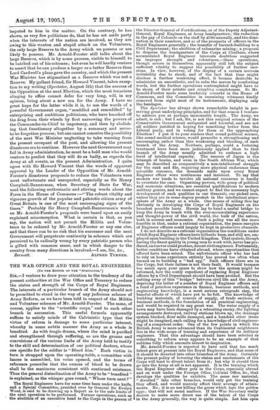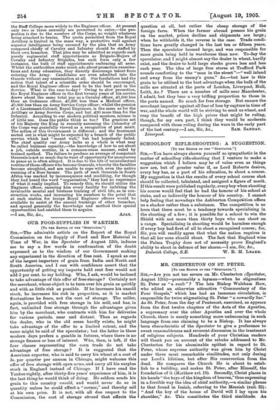(To THR EDITOR OF THE "SPECTATOR."]
Srit,—I venture to draw your attention to the tendency of the present authorities at the War Office and Treasury to reduce the status and strength of the Corps of Royal Engineers.
The interests of a particular branch of the Army should not be permitted to stand in the way of any judicious scheme of Army Reform, as we have been told in respect of the Militia and Volunteer schemes of Mr. Arnold-Forster. The same, of
course, applies to the "scientific corps," and to each other branch in succession. This useful formula apparently suffices to satisfy minds of the Calvinistic type that the
virtue of reform is damage to some particular interest, whereby in some subtle manner the Army as a whole is
benefited. As with tragic drama, where the mind is purified and strengthened through suffering, so are the groans and comoulsions of the various limbs of the Army held to testify to the skill and determination of our political doctors, whose one specific for the soldier is "Bleed him." Each victim in turn is strapped upon the operating-table, a committee with lances is assembled, his veins opened, and the terms of reference prescribe that the ounces of blood to be drawn shall be the maximum consistent with continued existence. Thus the general disinclination of the Army to be " benefited " is explained, as the whisper goes round, "Whose turn next ?"
The Royal Engineers have for some time been under the knife, and a Special Committee, presided over by General Sir Evelyn Wood, is said to be drawing up a Report as to the safe limits of the next operation to be performed. Former operations, such as the abolition of an executive head to the Corps in the person of
the Director-General of Fortifications, or of the Deputy Adjutant- General, Royal Engineers, at Army headquarters; the reduction in the pay of Colonels on the staff by £160 annually, and the dimi- nution in their numbers, and so of the prospects of officers in the Royal Engineers generally ; the transfer of barrack-building to a Civil Department ; the abolition of submarine mining ; a proposal to disperse the headquarters of the Corps at Chatham, where accumulated Royal Engineer interests doubtless suggested an improper strength and robustness,—these operations, though severe in themselves, apparently still left the subject sufficient vitality to suggest the possibility of further inci- sions. In view, however, of the display of a certain nervous irritability due to shock, and of the fact that time might disclose a further weakening effect, it became desirable to administer an anaesthetic, and to calm the nerves by comforting words, lest the further operations contemplated might have to be shorn of their artistic and crippling completeness. So Mr. Arnold-Forster made some laudatory remarks in the House of Commons, and the Committee in examining witnesses kindly removed from sight most of its instruments, displaying only the bandages.
The Spectator has always shown remarkable insight in per- ceiving great underlying principles, and for that reason I venture to address you at perhaps inexcusable length... The Army, we admit, is sick ; but I ask, Sir, is not this surgical science of the Conservative Government antiquated and harmful, and are not all soldiers justified in hoping for something better from the Liberal party, and in voting for them at the approaching Election? I put it to your readers that sound political science, like sound medical science, would prescribe a strengthening and encouraging, rather than this weakening and bleeding, of each branch of the Army. Nowhere, perhaps, could a fostering treatment have been more judiciously applied than to that branch of the Army usually admitted to embrace a high level of intellectual capacity. The success of Japan is the triumph of brains, and even in the South African War, which may be described as comparatively a non-intellectual struggle for the rank and file, requiring more physical endurance than scientific resource, the demands made upon every Royal Engineer officer were continuous and insistent. To say that modern war tends to involve all national resources is hardly to overstate the case. Organising powers wide grasp of political and economic situations, are essential qualifications to modern military genius, and we cannot expect to find the necessary high development of such qualities in our Generals, our picked men, unless they are in some degree pres'ent in the intellectual atmo- sphere of the Army as a whole. One means of aiding this lay obviously in developing the Corps of Royal Engineers on the broadest possible basis. Herein lay to hand a useful bridge to keep the Army in touch with the ever-accumulating experience and thought-power of the civil world, the bulk of the nation, both in science and economics. Such a policy was all the more feasible in that, under a rational organisation, the peace energies of Engineer officers could largely be kept in productive channels.
I do not describe as a rational organisation the conditions under which Royal Engineer officers have hitherto been, and still are, em- ployed upon building in the United Kingdom. That system, though having the finest quality in young men to work with, never has pro- duced, and never could produce, decent civil engineers. Fortunately, better conditions have obtained abroad, where opportunities that offered have been seized. The unfortunate officer who has had to rely on home experience entirely has proved too often when turned on to building a "bad egg." Such officers there are in the Corps, but their failure is not their fault. It would trespass too much upon your space to show how the system might be reformed, how the costly expedient of replacing Royal Engineer officers by a Civil Department should have been avoided. But the cutting away of this "bridge" between civil life and the Army, depriving the latter of a number of Royal Engineer officers and a fund of priceless experience in finance, business methods, and engineering knowledge, is a most serious retrograde step, the baneful effects of which have yet to be felt. The knowledge of building materials, of sources of supply, of trade sections, of business methods, is the foundation of all practical engineering, and would be required in any great war. The water supply of a town may have been damaged by a retreating enemy, the lighting arrangements destroyed, railway stations blown up, the drainage system blocked, flour mills damaged, and a hundred other items might be imagined, each calling for a knowledge of civil engineer- ing of a competent order. One of the few points in which the British Army is more advanced than its Continental neighbours lies in the wide scope of training and experience of its military engineers. That this advantage should have been selected as something to reform away appears to be an example of that sublime folly which amounts almost to inspiration.
Mr. Arnold-Forster is reported to have said that too much talent goes at present into the Royal Engineers, and that some of it should be diverted into other branches of the Army. Certainly the present policy of lowering the status and emoluments of the Corps will tend to divert talent from it; but why it should then go into the Army at all is not apparent. It is the training which the Royal Engineer officer gets in the Corps, especially abroad and on work under the Foreign Office, Colonial Office, &c., that develops the qualities he exhibits. The same raw material, " diverted " into other branches would only get the training
they afford, and would scarcely branches, their average of attain- ments. No; it is no use killing the goose which lays the golden eggs ; that will not mend matters. If the War Secretary really desires to make more direct use of the talent of the Corps in the Army generally, the way is quite simple. Let him open the Staff College more widely to the Engineer officer. At present only two or three annually are permitted to enter,—the pro- portion is due to the numbers of the Corps, no weight whatever being attached to brains. The quota permitted from the Royal Artillery is limited in the same way, a protective wall against superior intelligence being excused by the plea that an Army composed chiefly of Cavalry and Infantry should be staffed by their own branches. That plea may be admitted as regards such purely regimental staff appointments as Brigade-Majors of Cavalry and Infantry Brigades, but such form only a few instances, the bulk of staff appointments embracing all arms. Whilst the authorities make much ado about promotion examina- tions and Army education, they directly discourage talent from entering the Army. Candidates are even admitted into the Guards without any examination at all. Our forefathers had the notion that talent of a scientific order should be encouraged, and the Royal Engineer officer used to be the best paid in the Service. What is the case to-day ? Owing to slow promotion, the Royal Engineer officer in the first twenty years of his service draws about the same total pay as a Cavalry officer, 21,500 less than an Ordnance officer, 21,200 less than a Medical officer, 21,000 less than an Army Service Corps officer ; whilst the pension of a Lieutenant-Colonel, Royal Engineers, is the same as for the Artillary or Army Service Corps, and but 230 more than for the Infantry. According to our modern political mentors, science is of little use. Does the public think so too ? The gracious act of his Majesty the King in recently assuming the Colonelcy of the Corps was gratefully viewed as a recognition of past merit. The action of this Government is different ; and the treatment meted out is what might be expected by a branch of the public service which had "meant well," but had hopelessly failed. The chief quality our Army lacks as a whole is what may be called business capacity,—the knowledge of how to set about a job, outside routine, in a common-sense manner, ruled by trained method. The failure to produce an average of competent Generals is not so much due to want of opportunity for manceuvres in peace as is often alleged. It is due to the life of unintellectual routine of those officers who become Generals, whereby the faculties become atrophied, and are unable to cope with even the native cunning of a Boer farmer. The path of such Generals in South Africa was marked by inconsequence and muddling, for though they had heard the word "organisation," they had no experience of what it really implied. To remedy this, we should utilise the Engineer officer, ensuring him every facility for imbibing the invaluable mental and business training of civil life, as in con- struction works, and increasing his numbers to the point that at each station for troops Royal Engineer officers would be available to assist at the annual trainings of other branches, and spread generally the knowledge and method their special opportunities had enabled them to acquire.
—I am, Sir, &c., AJAX.



































 Previous page
Previous page